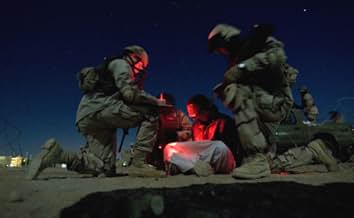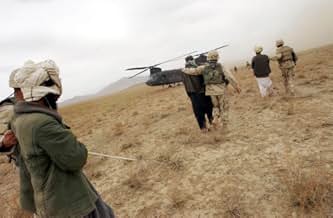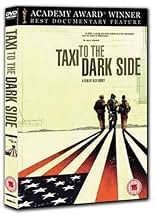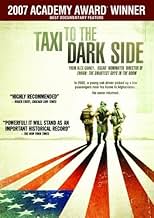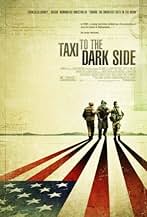AVALIAÇÃO DA IMDb
7,5/10
17 mil
SUA AVALIAÇÃO
Alex Gibney expõe os detalhes assombrosos das práticas de tortura e interrogatório dos EUA.Alex Gibney expõe os detalhes assombrosos das práticas de tortura e interrogatório dos EUA.Alex Gibney expõe os detalhes assombrosos das práticas de tortura e interrogatório dos EUA.
- Ganhou 1 Oscar
- 10 vitórias e 5 indicações no total
Alex Gibney
- Narrator
- (narração)
Moazzam Begg
- Self - Torture Victim
- (as Moazzam Beg)
George W. Bush
- Self
- (cenas de arquivo)
Jack Cafferty
- Self
- (cenas de arquivo)
Dick Cheney
- Self
- (cenas de arquivo)
Lynndie England
- Self
- (cenas de arquivo)
Tommy Franks
- Self - General
- (cenas de arquivo)
Avaliações em destaque
Yep, it is another one of those Iraq and Afghanistan documentaries. I know the burnout rate is high on these, which is probably why I almost did not bother, but nothing else was showing. Man, was I happy I saw this! It has rekindled my hate for the Bush administration, which had turned to apathy over the last year. This tells the story of an Afghani taxi driver that is mistakenly picked up as a Taliban supporter, but before they find out he was innocent, he has been beaten to death by his American torturers.
This film has interviews from all of the guards that were responsible, JAG officers, FBI people, CIA agents on the ground etc. And you see that all of the blame lies with Ashcroft and the Bushies, who gave one vague order after another that they wanted confessions and they wanted them quickly, with a wink and a nod about what kind of methods to use. So you have these frustrated high school drop-outs presiding over these people thousands of miles from anywhere, and they won't confess. So, beatings and humiliations follow. And when the crap comes out, the Bush administration passes a bill that absolves all higher-ups from any responsibility and they start to bust the enlisted men and women, who were following orders. Pathetic. Of course, we also find out that over 95% of the prisoners being held, were captured by Pakistanis and Northern Alliance people, WHO were paid by the US government for each person they turned over, guilty or not guilty. And you wonder why meaningful confessions were so hard to come by. It reminds me of the scene from Full Metal Jacket, where the psycho army guy shoots the Vietnamese farmers from his helicopter. He says the ones that run are VC, the ones that don't run are well trained VC. Very tragic.
This film has interviews from all of the guards that were responsible, JAG officers, FBI people, CIA agents on the ground etc. And you see that all of the blame lies with Ashcroft and the Bushies, who gave one vague order after another that they wanted confessions and they wanted them quickly, with a wink and a nod about what kind of methods to use. So you have these frustrated high school drop-outs presiding over these people thousands of miles from anywhere, and they won't confess. So, beatings and humiliations follow. And when the crap comes out, the Bush administration passes a bill that absolves all higher-ups from any responsibility and they start to bust the enlisted men and women, who were following orders. Pathetic. Of course, we also find out that over 95% of the prisoners being held, were captured by Pakistanis and Northern Alliance people, WHO were paid by the US government for each person they turned over, guilty or not guilty. And you wonder why meaningful confessions were so hard to come by. It reminds me of the scene from Full Metal Jacket, where the psycho army guy shoots the Vietnamese farmers from his helicopter. He says the ones that run are VC, the ones that don't run are well trained VC. Very tragic.
9imxo
There is something you need to know about this film: it is not about real insurgents or terrorists or about real soldiers, and it is certainly not an anti-American film.
It is about how senior military and civilian officials demand results from their subordinates, even if the results are to be obtained by unconscionable, immoral, and illegal means, up to, and including, torture and murder. The fact that many of these results - what the military like to call "the mission" - are faked or just wrong is of no particular concern to them. Naturally, you'll never find a document signed by any of those officials advocating torture and murder. The most you'll ever find is a reference to "enhanced interrogation techniques" (i.e., torture). And if a detainee dies, the senior officers and officials always benefit from "plausible deniability" and claim that it must be the fault of junior "bad apple" troops. If terrorists are murderers, some of our own troops have certainly engaged in murder, too. To reveal this is not anti-American; it's just a simple fact. Because the troops often do it in a group they think they're not murderers. Just as, I imagine, someone who participates in gang rape does not consider himself, individually, to be a rapist.
While most Military Police (MP) troops are fighting hard on the ground every day in Iraq and Afghanistan, one group of troops which this film examines are those Military Police who are used as prison guards. The other troops examined in the film are some military intelligence ("MI") troops employed as interrogators in prison camps.
If you don't know already, Military Police are usually despised by their own troops. If you give a soldier special power over his fellow soldiers he will often abuse it. I still recall an Australian friend of mine mentioning that many of the Aussie "Red Hats" (MPs) who sailed for home after WWII never made it back; their fellow troops threw them overboard.
The old saw about military intelligence being a contradiction in terms is never more apparent than in the case of interrogators. When you hear the word intelligence here you must forget all about spies, codes, and the stuff of James Bond novels. The interrogators of MI are an example of soldiers who are ill prepared, in general, to carry out work that would normally take years to master. They are mostly low-ranking enlisted men and women, privates and sergeants, almost none of whom speak with any proficiency the language of the detainees they're interrogating.
So, imagine the scenario: senior officials demanding intelligence, no matter how it's obtained; unqualified interrogators using whatever means they can think of to satisfy their superiors' demands; and MP prison guards who have the power of life and death over their detainees, with almost no restrictions on what they can do to them. Behind all this is the unwritten understanding that if something goes wrong, the troops will probably not be prosecuted. God help the innocent person swept up into this sadistic, bureaucratic system. But as we all know, if you've been arrested, you must be guilty. Right?
The elephant in the closet in all this is the Central Intelligence Agency, an organization that regards itself as above law, morality, and civilized behavior. It gets away with much of what it does by having the military, foreigners, and contractors to do its dirty work for it. And when somebody has to take a fall, well, that's what privates and sergeants are for. If your kids are MPs, interrogators, or just in the military, advise them always to watch their backs around those people.
This may be a disturbing film for civilians, but it won't include many surprises if you've served in the armed forces, or on a police force, or in a prison. Those are the people who know about this, but they're not about to tell you. No wander the USA has pulled out of the War Crimes Treaty. But what officials do not want to admit, even to themselves, is that war crimes are war crimes, no matter if you're a treaty signatory or not.
It is about how senior military and civilian officials demand results from their subordinates, even if the results are to be obtained by unconscionable, immoral, and illegal means, up to, and including, torture and murder. The fact that many of these results - what the military like to call "the mission" - are faked or just wrong is of no particular concern to them. Naturally, you'll never find a document signed by any of those officials advocating torture and murder. The most you'll ever find is a reference to "enhanced interrogation techniques" (i.e., torture). And if a detainee dies, the senior officers and officials always benefit from "plausible deniability" and claim that it must be the fault of junior "bad apple" troops. If terrorists are murderers, some of our own troops have certainly engaged in murder, too. To reveal this is not anti-American; it's just a simple fact. Because the troops often do it in a group they think they're not murderers. Just as, I imagine, someone who participates in gang rape does not consider himself, individually, to be a rapist.
While most Military Police (MP) troops are fighting hard on the ground every day in Iraq and Afghanistan, one group of troops which this film examines are those Military Police who are used as prison guards. The other troops examined in the film are some military intelligence ("MI") troops employed as interrogators in prison camps.
If you don't know already, Military Police are usually despised by their own troops. If you give a soldier special power over his fellow soldiers he will often abuse it. I still recall an Australian friend of mine mentioning that many of the Aussie "Red Hats" (MPs) who sailed for home after WWII never made it back; their fellow troops threw them overboard.
The old saw about military intelligence being a contradiction in terms is never more apparent than in the case of interrogators. When you hear the word intelligence here you must forget all about spies, codes, and the stuff of James Bond novels. The interrogators of MI are an example of soldiers who are ill prepared, in general, to carry out work that would normally take years to master. They are mostly low-ranking enlisted men and women, privates and sergeants, almost none of whom speak with any proficiency the language of the detainees they're interrogating.
So, imagine the scenario: senior officials demanding intelligence, no matter how it's obtained; unqualified interrogators using whatever means they can think of to satisfy their superiors' demands; and MP prison guards who have the power of life and death over their detainees, with almost no restrictions on what they can do to them. Behind all this is the unwritten understanding that if something goes wrong, the troops will probably not be prosecuted. God help the innocent person swept up into this sadistic, bureaucratic system. But as we all know, if you've been arrested, you must be guilty. Right?
The elephant in the closet in all this is the Central Intelligence Agency, an organization that regards itself as above law, morality, and civilized behavior. It gets away with much of what it does by having the military, foreigners, and contractors to do its dirty work for it. And when somebody has to take a fall, well, that's what privates and sergeants are for. If your kids are MPs, interrogators, or just in the military, advise them always to watch their backs around those people.
This may be a disturbing film for civilians, but it won't include many surprises if you've served in the armed forces, or on a police force, or in a prison. Those are the people who know about this, but they're not about to tell you. No wander the USA has pulled out of the War Crimes Treaty. But what officials do not want to admit, even to themselves, is that war crimes are war crimes, no matter if you're a treaty signatory or not.
In 2002 taxi driver Dilawar was picked up by US forces with his passengers in the desert and taken to Bagram prison in Afghanistan. Five days later he was dead. Injuries to his legs were compared with those he would have sustained if he had been run over by a truck had he lived it was likely that his legs would have had to have been amputated due to the damage. With this as the starting point, this documentary tells the story of the role of "torture" in the war on terror, from Abu Ghraid to Guantanamo.
Having put Gibney's documentary on Enron as one of my ten favourite films of 2005, I eagerly took up the opportunity the UK (and much of Europe) had to catch this on television ahead of the full release in the US in 2008. Shown as part of the BBC's excellent "Why Democracy" series of films, this one opened with the caption question "can terrorism destroy democracy?". To the casual listener the question appears to be about the ability of terrorists to bring down what we see as Government (ie by crashing planes into it) but really the question in regards this film appears to be more about whether our idea of freedom and democracy can survive the way we fight terrorism. As a result this film is about the use of "torture" against terrorist suspects, specifically focusing on the United States.
The reader may be wondering why the focus (in the title) on Dilawar. Well I did too because he died in Bagram and his story sadly ends there, while the vast majority of the film focuses on the infamous examples of torture and inhumane treatment in the other places. Well it turns out that Dilawar is a device and one that the film uses very well. The morality of the use of torture is not black and white and of course the usual "ticking time bomb" scenario is thrown up; the film does counter this by suggesting that the weekly scenarios in Fox's 24 are not the norm (to say the least) but the best answer to most of the moral questions are simply to refer back to a taxi driver who died after five days in captivity with horrific injuries the film doesn't say he was innocent but it doesn't need to nobody suggests he was evil or a key player either, but yet he is dead. This hangs over the film even though he is not the focus after the first twenty minutes.
What the film does from then on in is paint a picture of lack of respect for humanity, lack of respect for international laws, lack of accountability and lack of transparency. The film plays a clip of Rumsfeld speaking on the (then) allegations of mistreatment and says that it will be looked into so that "the world will see how a free system, a democratic system, functions and operates"; well he was right and it is not pretty viewing. As with Enron, Gibney does betray his politics and the film has very little in the way of even handedness about the debate. This is a little disappointing in regards the debate but the overwhelming nature of the presentation of arrogance and carelessness did make wonder how you would balance these issues certainly the quotes I have heard down the years from politicians have not been able to convince. Certainly a clip of Bush talking about "suspected terrorists" who have died, or as he says "put it this way they're no longer a problem to the United States"; the fact that he acknowledges they are "suspects" rather than convicts but yet sees their death as a good thing says it all.
Considering this issue is everywhere in the media, Gibney does very well to structure his film to build it from the ground up. Not only does he use the words of the Bush administration against them ("the only thing I know for certain is that these are bad people") but he also details the wider political picture beyond the blame that was dumped onto Lynndie England, Charles Graner and others. He does this very well, bringing in the input of John Yoo and the terribly smarmy Alberto Gonzales. Even after the photographs in the paper, seeing the unedited video and hearing firsthand accounts from both sides is shocking and disturbing affair again, how would you set out to "balance" these? Beyond the issue of torture I found the lack of accountability and ownership to be just as shocking as privates are floated down the river while those in charge never face worse than early retirement. The biggest challenge with this material is to keep it as a valid piece of work even as the topic grows daily and that many will be tired of hearing about it just this last week or so we have seen more debate and also the CIA deleting old tapes of interrogations (tapes that Bush has "no recollection" of existing); however Gibney brings the film to a close well, making it feel like something that can stand still and still work the personal touch of his late father's comments at the end (himself a WWII Navy interrogator) talking about how "we" should be different than "them", making for a suitable summing up of why the film is important.
Another strong documentary from Gibney despite the lack of balance and the challenges with the topic. It deserves to be seen by a bigger audience than it has been, even if it won't make the difference it should do. Depressing to think that, decades from now people will look back on this and wonder how on earth we allowed our leaders to do this in our names and let them get away with it.
Having put Gibney's documentary on Enron as one of my ten favourite films of 2005, I eagerly took up the opportunity the UK (and much of Europe) had to catch this on television ahead of the full release in the US in 2008. Shown as part of the BBC's excellent "Why Democracy" series of films, this one opened with the caption question "can terrorism destroy democracy?". To the casual listener the question appears to be about the ability of terrorists to bring down what we see as Government (ie by crashing planes into it) but really the question in regards this film appears to be more about whether our idea of freedom and democracy can survive the way we fight terrorism. As a result this film is about the use of "torture" against terrorist suspects, specifically focusing on the United States.
The reader may be wondering why the focus (in the title) on Dilawar. Well I did too because he died in Bagram and his story sadly ends there, while the vast majority of the film focuses on the infamous examples of torture and inhumane treatment in the other places. Well it turns out that Dilawar is a device and one that the film uses very well. The morality of the use of torture is not black and white and of course the usual "ticking time bomb" scenario is thrown up; the film does counter this by suggesting that the weekly scenarios in Fox's 24 are not the norm (to say the least) but the best answer to most of the moral questions are simply to refer back to a taxi driver who died after five days in captivity with horrific injuries the film doesn't say he was innocent but it doesn't need to nobody suggests he was evil or a key player either, but yet he is dead. This hangs over the film even though he is not the focus after the first twenty minutes.
What the film does from then on in is paint a picture of lack of respect for humanity, lack of respect for international laws, lack of accountability and lack of transparency. The film plays a clip of Rumsfeld speaking on the (then) allegations of mistreatment and says that it will be looked into so that "the world will see how a free system, a democratic system, functions and operates"; well he was right and it is not pretty viewing. As with Enron, Gibney does betray his politics and the film has very little in the way of even handedness about the debate. This is a little disappointing in regards the debate but the overwhelming nature of the presentation of arrogance and carelessness did make wonder how you would balance these issues certainly the quotes I have heard down the years from politicians have not been able to convince. Certainly a clip of Bush talking about "suspected terrorists" who have died, or as he says "put it this way they're no longer a problem to the United States"; the fact that he acknowledges they are "suspects" rather than convicts but yet sees their death as a good thing says it all.
Considering this issue is everywhere in the media, Gibney does very well to structure his film to build it from the ground up. Not only does he use the words of the Bush administration against them ("the only thing I know for certain is that these are bad people") but he also details the wider political picture beyond the blame that was dumped onto Lynndie England, Charles Graner and others. He does this very well, bringing in the input of John Yoo and the terribly smarmy Alberto Gonzales. Even after the photographs in the paper, seeing the unedited video and hearing firsthand accounts from both sides is shocking and disturbing affair again, how would you set out to "balance" these? Beyond the issue of torture I found the lack of accountability and ownership to be just as shocking as privates are floated down the river while those in charge never face worse than early retirement. The biggest challenge with this material is to keep it as a valid piece of work even as the topic grows daily and that many will be tired of hearing about it just this last week or so we have seen more debate and also the CIA deleting old tapes of interrogations (tapes that Bush has "no recollection" of existing); however Gibney brings the film to a close well, making it feel like something that can stand still and still work the personal touch of his late father's comments at the end (himself a WWII Navy interrogator) talking about how "we" should be different than "them", making for a suitable summing up of why the film is important.
Another strong documentary from Gibney despite the lack of balance and the challenges with the topic. It deserves to be seen by a bigger audience than it has been, even if it won't make the difference it should do. Depressing to think that, decades from now people will look back on this and wonder how on earth we allowed our leaders to do this in our names and let them get away with it.
Taxi to the Dark Side accomplishes what a documentary, or just a concise analysis, regarding all of the facts in one of the many nightmares the United States' involvement in the middle east should: to inspire the utmost disgust and condemnation of a system that has become as corrupt as it has (or rather always has been with this bunch). It's uncontainable to think how all of this started, grew exponentially, and resulted ultimately in the horrors at Abu Gharyb and Guantanamo Bay, in that it is nestled in the twisted, criminal (yes folks, criminal) 'policies' of the Bush administration. But Alex Gibney's approach isn't narrow-minded but multi-faceted: he's interested in what a complex, ugly organism torture has become, the psychological just as much as the physical, and he has a man at the center of it. Dilawar, an innocent taxi driver from a poor farm in Afghanistan, was swept up by three other Afghan soldiers and sent to Bagram prison, where along with other supposed terrorists or terrorist collaborators was tortured (in his case especially in brutal fashion, as we learn in graphic description from those who participated first-hand), and died from the trauma.
His death was a controversy, but not one that ever got the kind of attention it deserved; until this documentary I never even heard of Dilawar or even much about Bagram prison. Yet it was at this prison, as well as the first biggie interrogation of the would-be 20th hijacker of the plane on 9/11 to crash in Pennsylvania (which, by false confession, led to an over-excited but false-rooted assumption that Al Quaeda had links to Baghdad), that led to Abu Gharyb, which revealed the horrors of soldiers in unyielding terror over their subjects but, more importantly, the virus that spread through the chain of command. Gibney's approach is approximate and expertly probing: it's not enough to just focus of Dilawar (even as his story could make up a whole legitimate documentary alone), or on Abu Gharyb. As in his previous film, Enron: The Smartest Guys in the Room, it's essential to dissect this wretched beast from top to bottom, to see not simply the soldiers first-hand accounts, but straight from the horse's mouth the words from Cheney, Rumsfeld, Powell, and Bush himself.
Because, in reality, there is something to feel sorry for with these soldiers. It can be argued, and not without just cause, that what the soldiers did at Bagram, Abu Gharyb, and to an extent even at GITMO, was wrong and rotten and they could have said no and so on and so forth. However, as with the ground war situation in Iraq, it's all about the chain of command, and the fact that no matter what the parties initially responsible are not held accountable for any of their actions. It's almost frightening to forget the amount of footage available with these men like Rumsfeld and Gonzalez and Cheney where they not only admit to being fine with torture tactics - and whether or not it's psychological torture or not is besides the point as ALL torture IS torture, albeit a facet that Gibney brilliantly chronicles in the history of the CIA to its 'logical' extension in recent years - but set it up in legal wrangling so as to not get it any trouble for what they've done which is, of course, breaking Geneva conventions and whatnot.
If I sound like I'm sounding bias with this, then you should leave this review right now. There is no bias when it comes to this issue (or rather there SHOULD be no bias, as for a split second McCain showed until he relented recently that torture isn't as bad as he used to think). What one sees as the line between what is proper interrogation of a subject and outright abuse to get that "ticking time-bomb" is revealed by Kloogman from the FBI, who paraphrases how an interrogation would usually be done and lays it on the line that this form has actually had results - not pain and death or, at best, a bull**** court at GITMO where it's like a joke Kafka wouldn't write. Gibney presents all the information with the bluntness that's required, with testimony, footage from press conferences and commissions (i.e. that cringe-inducing bit with Gonzalez where he has a horrible pause when trying to answer a simple question about whether or not to condone torture), and it's presented lucidly, edited for a cumulative effect and with the skill of a filmmaker in total trust with his subject(s) to take all of the pieces into a whole that shakes one to the core.
And all of this would be powerful enough to make an impact, but with the recent explosion of news coverage on water-boarding - and that the CIA has admitted to torturing three subjects - Taxi to the Dark Side remains startlingly relevant. In fact, it's even more tragically relevant than last year's Sicko or even No End in Sight. From the tragedy of Dilawar to the tragedy of Abu Gharyb, which was like Salo turned into as shockingly real as could never be imaginable, the Bush administration has put the US into even more danger than ever before by resorting to the lowest form of humanity, condoning acts to the soldiers that sixty years ago would never be committed in the harshest of circumstances on our side. This, again, isn't some silly bias, this is just fact. It's enough to make one sick to one's stomach, and as long as a film such as this exists, the pain can't be brushed aside or dulled by diverting network news.
His death was a controversy, but not one that ever got the kind of attention it deserved; until this documentary I never even heard of Dilawar or even much about Bagram prison. Yet it was at this prison, as well as the first biggie interrogation of the would-be 20th hijacker of the plane on 9/11 to crash in Pennsylvania (which, by false confession, led to an over-excited but false-rooted assumption that Al Quaeda had links to Baghdad), that led to Abu Gharyb, which revealed the horrors of soldiers in unyielding terror over their subjects but, more importantly, the virus that spread through the chain of command. Gibney's approach is approximate and expertly probing: it's not enough to just focus of Dilawar (even as his story could make up a whole legitimate documentary alone), or on Abu Gharyb. As in his previous film, Enron: The Smartest Guys in the Room, it's essential to dissect this wretched beast from top to bottom, to see not simply the soldiers first-hand accounts, but straight from the horse's mouth the words from Cheney, Rumsfeld, Powell, and Bush himself.
Because, in reality, there is something to feel sorry for with these soldiers. It can be argued, and not without just cause, that what the soldiers did at Bagram, Abu Gharyb, and to an extent even at GITMO, was wrong and rotten and they could have said no and so on and so forth. However, as with the ground war situation in Iraq, it's all about the chain of command, and the fact that no matter what the parties initially responsible are not held accountable for any of their actions. It's almost frightening to forget the amount of footage available with these men like Rumsfeld and Gonzalez and Cheney where they not only admit to being fine with torture tactics - and whether or not it's psychological torture or not is besides the point as ALL torture IS torture, albeit a facet that Gibney brilliantly chronicles in the history of the CIA to its 'logical' extension in recent years - but set it up in legal wrangling so as to not get it any trouble for what they've done which is, of course, breaking Geneva conventions and whatnot.
If I sound like I'm sounding bias with this, then you should leave this review right now. There is no bias when it comes to this issue (or rather there SHOULD be no bias, as for a split second McCain showed until he relented recently that torture isn't as bad as he used to think). What one sees as the line between what is proper interrogation of a subject and outright abuse to get that "ticking time-bomb" is revealed by Kloogman from the FBI, who paraphrases how an interrogation would usually be done and lays it on the line that this form has actually had results - not pain and death or, at best, a bull**** court at GITMO where it's like a joke Kafka wouldn't write. Gibney presents all the information with the bluntness that's required, with testimony, footage from press conferences and commissions (i.e. that cringe-inducing bit with Gonzalez where he has a horrible pause when trying to answer a simple question about whether or not to condone torture), and it's presented lucidly, edited for a cumulative effect and with the skill of a filmmaker in total trust with his subject(s) to take all of the pieces into a whole that shakes one to the core.
And all of this would be powerful enough to make an impact, but with the recent explosion of news coverage on water-boarding - and that the CIA has admitted to torturing three subjects - Taxi to the Dark Side remains startlingly relevant. In fact, it's even more tragically relevant than last year's Sicko or even No End in Sight. From the tragedy of Dilawar to the tragedy of Abu Gharyb, which was like Salo turned into as shockingly real as could never be imaginable, the Bush administration has put the US into even more danger than ever before by resorting to the lowest form of humanity, condoning acts to the soldiers that sixty years ago would never be committed in the harshest of circumstances on our side. This, again, isn't some silly bias, this is just fact. It's enough to make one sick to one's stomach, and as long as a film such as this exists, the pain can't be brushed aside or dulled by diverting network news.
Too few have heard of Dilawar. Those who have will probably never forget him. Alex Gibney certainly will not. His latest film starts and ends with this poor innocent taxi driver who, in 2002, was taken to the Bagram airbase in Afghanistan. Five days later, he was dead.
Dilawar's death was the spark which ultimately led to the international awareness of what the Bush administration was doing to its detainees in the war on terror. Gibney's film, however, decides to look up the tree, not down, to discover who was really responsible for these unpleasant developments.
Gibney's film is bolstered by frank and interesting interviews with some of the troops on the ground. Their remorse is clear, as is their disgust. And disgust is the right word. This is, by no means, an easy watch. The use of the appalling footage which has been generated by the recent conflicts is necessary because, if anyone is in any doubt about how morally reprehensible these tactics are, this film will make it abundantly clear.
However, this film's real strength is the structure of its attack on the tactics that are employed. Gibney demonstrates that the tactics used are hopelessly inadequate and never yield effective information. There is a cutting and brilliant comparison with the old techniques and the new where an interviewee, a former FBI interrogator, uses his old tools of interrogation words and you can feel yourself being persuaded.
This is not just a polemic. It is a human story and a powerful and well-constructed argument. It should be essential viewing as what has happened at Guantanamo, Bagram and Abu Ghraib should never be forgotten. This is excellent, important film-making.
4 Stars out of 5
Dilawar's death was the spark which ultimately led to the international awareness of what the Bush administration was doing to its detainees in the war on terror. Gibney's film, however, decides to look up the tree, not down, to discover who was really responsible for these unpleasant developments.
Gibney's film is bolstered by frank and interesting interviews with some of the troops on the ground. Their remorse is clear, as is their disgust. And disgust is the right word. This is, by no means, an easy watch. The use of the appalling footage which has been generated by the recent conflicts is necessary because, if anyone is in any doubt about how morally reprehensible these tactics are, this film will make it abundantly clear.
However, this film's real strength is the structure of its attack on the tactics that are employed. Gibney demonstrates that the tactics used are hopelessly inadequate and never yield effective information. There is a cutting and brilliant comparison with the old techniques and the new where an interviewee, a former FBI interrogator, uses his old tools of interrogation words and you can feel yourself being persuaded.
This is not just a polemic. It is a human story and a powerful and well-constructed argument. It should be essential viewing as what has happened at Guantanamo, Bagram and Abu Ghraib should never be forgotten. This is excellent, important film-making.
4 Stars out of 5
Você sabia?
- Citações
Damien Corsetti - Military Interrogator: You put people into a crazy situation, people will do crazy things.
- Trilhas sonorasIn My Little Corner of the World
Words by Bob Hilliard Music by Lee Pockriss
Published by Better Half Music (Division of Bourne Co.)
and Emily Music Corporation
Performed by Yo La Tengo
Courtesy of Matador Records
Principais escolhas
Faça login para avaliar e ver a lista de recomendações personalizadas
- How long is Taxi to the Dark Side?Fornecido pela Alexa
Detalhes
Bilheteria
- Orçamento
- US$ 1.000.000 (estimativa)
- Faturamento bruto nos EUA e Canadá
- US$ 274.661
- Fim de semana de estreia nos EUA e Canadá
- US$ 10.930
- 20 de jan. de 2008
- Faturamento bruto mundial
- US$ 294.309
- Tempo de duração1 hora 46 minutos
- Cor
- Mixagem de som
- Proporção
- 1.85 : 1
Contribua para esta página
Sugerir uma alteração ou adicionar conteúdo ausente

Principal brecha
By what name was Um Táxi para a Escuridão (2007) officially released in India in English?
Responda





